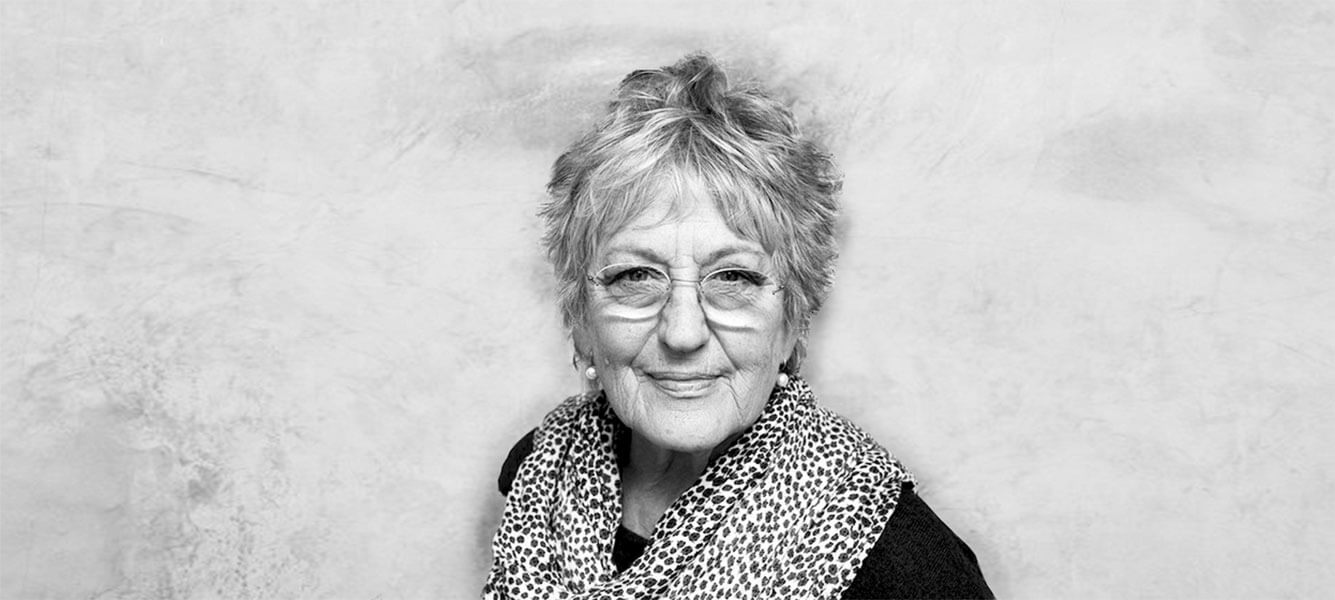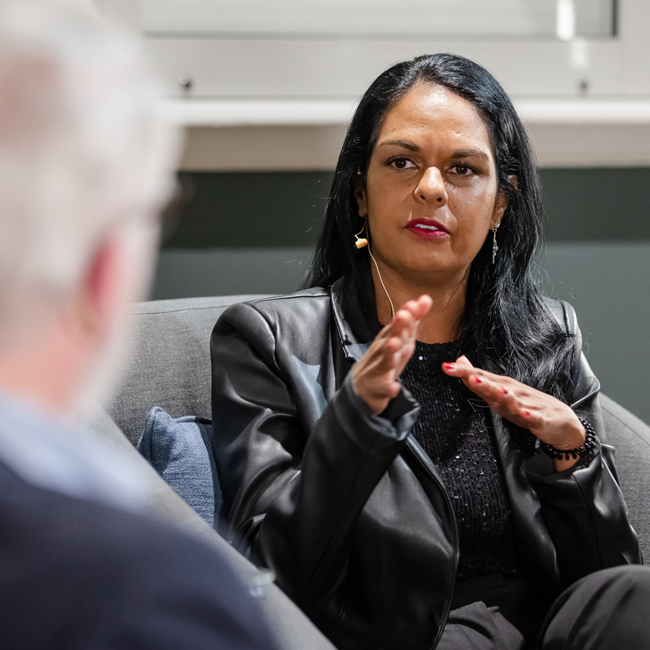Big Thinker: Michael Sandel

Big Thinker: Michael Sandel
Big thinkerPolitics + Human Rights
BY Dr Laura D’Olimpio The Ethics Centre 9 MAR 2020
Prominent contemporary American political philosopher, Michael J. Sandel’s (1953—present) work on justice, ethics, democracy and markets has connected with millions around the world.
His popular first year undergraduate course, Justice, became Harvard University’s first freely available course – online and televised.
Sandel’s Socratic approach connects moral and political theories and concepts to everyday life, helping to engage his audience in otherwise complex philosophical ideas.
He recognises, “there is a great hunger…to engage in serious reflection on big, ethical questions that matter politically, but also that matter personally.”
We all face ethical and political dilemmas, decisions and disagreements. These are not always easy to resolve and often bring us into conflict with others whose views differ from our own. Sandel is quite clear on the remedy, that “we need to rediscover the lost art of democratic argument” and this is precisely what he models and facilitates.
Who we are
Sandel is known for emphasising the social aspects of our identities. He says that we think of ourselves “as members of this family or community or nation or people, as bearers of this history, as sons or daughters of that revolution, as citizens of this republic”, which illustrates our attachment to others as well as our contextual social reality. In this way he offers a critique of Rawlsian liberalism.
Liberalism, and particularly the view espoused by John Rawls in his 1971 book A Theory of Justice, sees people as highly individualised, rational and focussed on defending their rights. On this view, the government’s role is to protect individual freedom and fairly obtain and distribute resources.
Rawls’ famous thought experiment of the ‘veil of ignorance’ asks us to imagine ourselves prior to knowing who we are going to be in the world. If we do not know whether we will be male or female, able-bodied or beautiful or the opposite, or which race, class, or religion we will belong to, we should be able to fairly decide on the best policies by which a society should operate. This is the best way, Rawls believed, to achieve justice.
Conversely, Sandel argues that humans cannot be neutral in this way. When figuring out what we should do, people bring their “moral and spiritual encumbrances, traditions, and convictions” with them to the negotiating table.
In this way, talk of rights can only be understood in relation to what people think of as good, valuable and important in their lives, which is connected to their social and material circumstances. Thus, the abstract thought experiment Rawls details simply won’t work.
Civic engagement
Against the view that we are always free to choose what and who we care about and which are our special obligations, Sandel points out that certain commitments, such as those to our family and our political community, bind and restrict us in certain ways.
Precisely because we cannot be disinterested or disconnected when it comes to matters of political decision making, Sandel emphasises the importance of finding ways to support and increase civic engagement – as evidenced in his TED talk, The lost art of democratic debate, watched by over 1.4 million people.
By having a positive and active national political community that works towards the good of all, we can make sense of justice for real people situated in real world contexts. In this respect, he believes dialogue and respectful disagreement are vital.
“If everyone feels they are heard, even if they don’t get their way, they will be less resentful than if we pretend we are going to decide policy in a way that is neutral.”
Market societies
Something that really concerns Sandel is how we, in developed countries, have gone from having a market economy to becoming market societies. What this means is that everything is up for sale. If market thinking and market values dominate, then other values – those of the good life, education, relationships, and creativity – are squeezed out.
If everything is valued first and foremost economically, then the difference between the haves and have-nots matters. If money buys you a better education, better health care, better legal representation, as well as more material possessions and business opportunities, the cycle of poverty becomes increasingly insurmountable.
The ‘luck’ of being born into wealth should not count more towards one’s success than hard work, natural talent or intelligence. Yet this is increasingly evident in today’s world and, in this way, inequality and affluence determine much more than they should. As a result, the notion of ‘merit’ is loaded.
Sandel claims we live in a meritocratic society, yet merit itself is a tyrannical construct:
“The notion that your fate is in your hands, that ‘you can make it if you try!’ is a double-edged sword. Inspiring in one way, but invidious in another. It congratulates the winners, but denigrates the losers, even in their own eyes”.
Instead, we need to be more inclusive and recognise that everyone has a role to play in our shared fate, regardless of who is wealthy or poor. In order to move forward together, “we need to find our way to a morally more robust discourse, one that takes seriously the corrosive effect of meritocratic striving on the social bonds that constitute our common life.”
Posing provocative questions such as: Should you pay a child to read a book? Should a prisoner pay to upgrade their accommodation? Can we place a monetary value on the Great Barrier Reef? Sandel compels us to consider what values should govern civic life, and how we might rethink the role of the market in a democratic society.
Ethics in your inbox.
Get the latest inspiration, intelligence, events & more.
By signing up you agree to our privacy policy
You might be interested in…
Big thinker
Politics + Human Rights, Relationships
Big Thinker: Germaine Greer
Opinion + Analysis
Politics + Human Rights
Enough and as good left: Aged care, intergenerational justice and the social contract
Opinion + Analysis
Politics + Human Rights
Billionaires and the politics of envy
Opinion + Analysis
Politics + Human Rights, Society + Culture
Education is more than an employment outcome
BY Dr Laura D’Olimpio
Dr Laura D’Olimpio is senior lecturer in philosophy of education at the University of Birmingham, UK, and co-edits the Journal of Philosophy in Schools.
BY The Ethics Centre
The Ethics Centre is a not-for-profit organisation developing innovative programs, services and experiences, designed to bring ethics to the centre of professional and personal life.
CoronaVirus reveals our sinophobic underbelly

CoronaVirus reveals our sinophobic underbelly
Opinion + AnalysisHealth + WellbeingPolitics + Human RightsRelationships
BY Simon Longstaff The Ethics Centre 6 MAR 2020
A virus knows no race. It is indifferent to your religion, your culture and your politics. All a virus ‘cares about’ is your biology … For that, one human is as good as any other.
Despite this, it’s easy enough to find recent reports of Australians experiencing discrimination for no reason other than their Chinese family heritage.
Such attacks are examples of racism – the irrational belief that an individual or group possesses intrinsic characteristics that justify acts of discrimination. That this is occurring is not in doubt.
For example, Australia’s Chief Medical Officer, Professor Brendan Murphy has seen enough of such behaviour to make explicit reference to the phenomena, labelling xenophobia and racial profiling as “completely abhorrent”.
Professor Murphy’s position is one of principle. However, there is also a practical aspect to his admonition. Managing the risks of an outbreak of a pathogen like the novel coronavirus COVID-19 requires health officials and the wider community to make rational choices based on an accurate assessment of risk. Racism is irrational. It distorts judgement and draws attention away from where the risks really lie. Ethically it is wrong. Medically, it is idiotic and dangerous.
This rise in racism, prompted by the emergence of COVID-19, reveals how thin the veneer of decency is that keeps latent racist tendencies in check. It seems that, given half-a-chance, the mangy old dog of Sinophobia is ready to raise its head, no matter how long it has laid low.
Of course there is nothing new about Sinophobia in Australia. Fear of the ‘yellow peril’ is woven through the whole of Australia’s still-unfolding colonial history. Many factors have stoked this fear, including: persistent doubts about the legitimacy of British occupation of an already settled continent, ignorance of (and indifference to) Chinese history and culture, the European cultural chauvinism that such ignorance fosters, the belief that numerical supremacy is, ultimately, a determining force in history, the need to find scapegoats when the dominant culture falters, and so on.
Whatever the historical cause of this persistent fear, the present ‘trigger’ is the inexorable rise of China as an economic and military super power – a power that is increasingly inclined to demand (rather than earn) deference and respect.
The situation is made more volatile by the growing tendency for the China of President Xi Jinping to link its power and success to what is uniquely ‘Chinese’ about its history and character. Add to this a broadly accepted Chinese cultural preference for harmony and order and the nation is often presented as if it is a ‘monolithic whole’ – not just in terms of its autocratic government but in its essential character.
Unfortunately, all of this feeds the beast of racist prejudice. Those who feel threatened by the changing currents of history seize on even the flimsiest threads of difference and use these to weave a narrative of ‘us’ and ‘them’ – in which others are presented as being essentially and irremediably different. This is the racists’ central trope – that difference is more than skin deep! Biology makes you one of ‘us’ or you are not.
It’s nonsense. Yet, it’s a nonsense that sticks in some quarters, especially during times of uncertainty such as this; when the general public is feeling betrayed by the elites, when institutions have lost trust and have weakened legitimacy and when increasing numbers of people fear for their future and that of their families.
Unfortunately, tough times provide fertile ground for politicians who are willing to derive electoral dividends by practising the politics of exclusion. It is a cheap but effective form of politics in which people define their shared identity in terms of who is kept outside the group.
It is far harder to practise the politics of inclusion – in which disparate groups find a common identity in the things they hold in common. This too can work, but it takes great energy and superior skills of leadership to achieve this outcome. Yet, it is the latter approach that Australia must look for, if only as a matter of national self-interest.
This is because racist attacks against Australians of Chinese descent also have a significant national security dimension. As I have written elsewhere, social cohesion is a vital component of a nation’s ‘soft power’ when defending against foes who covertly seek to ‘divide and conquer’.
The risk of such attacks is increasing as the world drifts back to a pre-Westphalian strategic environment in which the international, rules-based order breaks down and nations freely interfere with the domestic affairs of their rivals. In these circumstances, the last thing Australia needs is deepening divisions based on spurious beliefs about supposed racial deliveries.
Those who create or exploit those divisions wound the body politic, weaken our defences and undermine the public interest.
All of that said, it is important not to overstate the dimensions of the problem. Australia is a notable successful multicultural nation where harmonious relations prevail. This is despite there being an undercurrent of racism that has been more or less visible throughout Australia’s modern history.
Racism is never justified. Not by the fact that it is found to the same degree in other societies, and not even when its manifestation is rare. Although it offers little comfort, it should also be acknowledged that discrimination is as much a product of other forms of prejudice concerning religion, gender, culture, etc.
We have the capacity to do and be better. This is a choice we can and should make for the sake of our fellow citizens – whatever their background – and in the interests of the nation as a whole.
So, given that China is not likely to take a backwards step and Australians of Chinese background cannot (and should not) disguise their heritage, how should we respond to the latest bout of Sinophobia?
Attack prejudice with fact
A first step should be to follow the example of Australia’s Chief Medical Officer and attack prejudice with the facts. Professor Murphy’s example showed how facts about medicine can be deployed to calm fears and neutralise racist myths. This approach should be extended to other areas. For example, more should be known of the long history and extraordinary contribution of Australians of Chinese heritage.
This account should not merely tell the story of elite performance, economic contribution, etc. It should also speak of those who have fought in Australia’s wars, built its infrastructure, educated its children, nursed its sick … and so on. In short, we need to see more of the extraordinary in the ordinary.
Reframe the narrative
Second, we need to reframe the narrative about China and the Chinese. Today, most commentary portrays China as both a security threat and an economic enabler. It is both. However, this is only a small part of the story.
For the most part, we see little of the life of the Chinese people. We are largely ignorant of the achievements of their remarkable civilisation. One might think that the closeness of the economic relationship might be a positive factor. However, regular reporting about Australia’s economic dependence on China, is not helping the situation.
I know that this will seem counter-intuitive to some. However, the more we speak of Chinese students propping up our universities, of Chinese tourists sustaining our tourism industry and of Chinese consumers boosting our agricultural exports … the more it makes it sound as if the Chinese are little more than an economically essential ‘necessary evil’ – a ‘commodity’ that comes and goes in bulk.
This view of the Chinese negatively influences attitudes towards Australia’s own citizens of Chinese descent. Fortunately, a solution to the ‘commodification’ of the Chinese is at hand, if only we wish to embrace it. The large number of Chinese students who study in Australia offer an opportunity to build better understanding and stronger relationships.
Unfortunately, the Chinese student experience in Australia is reported not to be as positive as it should be. Too many arrive without the English language skills to engage more widely with the community. Too many find themselves lonely and isolated. Too many find solace in sticking with those they know and understand. With some justification, large numbers feel as if they are little more than a ‘cash cow’.
Invest in ethical infrastructure
Third, we need to invest in Australia’s own ‘ethical infrastructure’ – much of which is damaged or broken. We need to repair our institutions so that they act with integrity and merit the trust of the wider community. We need to work on the core values and principles that underpin social cohesion.
Part of this task must be to come to terms with the truth about the colonisation of Australia. This is not to invoke the ‘black arm band’ view of history. The truth is both good and bad. However, whatever its character, our truth remains untold. I sincerely believe that Australia’s ‘soft power’ is weaker than it would otherwise be, if only we could address this unfinished business.
Alleviate fear
Fourth and finally, the measures outlined above will be ineffective unless we also name the latent fears of average Australians. People across the nation want these ‘bread and butter’ issues to be acknowledged and addressed:
- How safe is my job?
- If I lose my current job, will I find another?
- If I can’t find another job, how will I pay my bills?
- Will I be cared for if I get sick?
- Will my children get an education that equips them to live a good life in the future?
- Can I move about with relative ease and efficiency?
- How will the nation feed itself?
- Are we safe from attack?
- Who can step in cases of natural disaster or man-made calamity?
- Why are our leaders not held to account when we are?
- Why can’t I be left alone to do as I please?
- Who cares about me and those I care about?
Failure to speak to the truth of these deep concerns leaves the field wide open for the lies of those who would stoke the fires of racism.
Unravel the complexities of the political relationship between China and Australia at ‘The Truth About China’, a panel conversation at The Festival of Dangerous Ideas, Saturday 4 April. Tickets on sale now
Ethics in your inbox.
Get the latest inspiration, intelligence, events & more.
By signing up you agree to our privacy policy
You might be interested in…
Opinion + Analysis
Politics + Human Rights, Relationships
We’re being too hard on hypocrites and it’s causing us to lose out
Explainer
Relationships
Ethics Explainer: Begging the question
Opinion + Analysis
Relationships
Paralympian pay vs. Olympian pay
Opinion + Analysis
Business + Leadership, Health + Wellbeing
Is your workplace turning into a cult?
BY Simon Longstaff
Simon Longstaff began his working life on Groote Eylandt in the Northern Territory of Australia. He is proud of his kinship ties to the Anindilyakwa people. After a period studying law in Sydney and teaching in Tasmania, he pursued postgraduate studies as a Member of Magdalene College, Cambridge. In 1991, Simon commenced his work as the first Executive Director of The Ethics Centre. In 2013, he was made an officer of the Order of Australia (AO) for “distinguished service to the community through the promotion of ethical standards in governance and business, to improving corporate responsibility, and to philosophy.” Simon is an Adjunct Professor of the Australian Graduate School of Management at UNSW, a Fellow of CPA Australia, the Royal Society of NSW and the Australian Risk Policy Institute.
BY The Ethics Centre
The Ethics Centre is a not-for-profit organisation developing innovative programs, services and experiences, designed to bring ethics to the centre of professional and personal life.
‘Woke' companies: Do they really mean what they say?

‘Woke’ companies: Do they really mean what they say?
Opinion + AnalysisBusiness + Leadership
BY Fiona Smith The Ethics Alliance The Ethics Centre 2 MAR 2020
Virtue-signalling has a bad name. It is often derided as the boasting people do to feel superior – even when they have no intention of living up to the ideal.
It is like when they posted Facebook videos of pouring icy water over their own heads, hashtagged #IceBucketChallenge, but raised no money for research into Motor Neurone Disease.
Or when $US5.5 billion fast food company KFC appeared to use the challenge as a branding exercise, offering to donate up to $10,000 if its own buckets were used.
But here’s the thing: despite free riders and over-eager marketers, the 2014 viral campaign raised more than $A168 million in eight weeks and was able to fully fund a number of research projects.
If some of those getting in on the act gave nothing for the cause, does it matter? It is possible that, by flooding social media with the images, they helped build momentum for an extraordinarily successful campaign.
So, can virtue signalling also have a positive spin?
Conservative British journalist and former banker, James Bartholemew, claims to have invented the term “virtue signalling” in a column for The Spectator in 2015. He wrote: “It’s noticeable how often virtue signalling consists of saying you hate things.”
He says virtue signalling is often a person or brand attempting to aggrandise or promote themselves.
If you were frank, Bartholemew explains, what you would actually say is: “I care about the environment more than most people do” or “I care about the poor more than others”.
“But your vanity and self-aggrandisement would be obvious…”
Bartholemew says the term “virtue signalling” is pejorative in nature: “It is usually used as a judgement on what somebody else is saying. It is a judgement just like saying that somebody is boring or self-righteous. So it is not going to be used to praise somebody, but for taking a particular position.”
Virtue signalling: An attempt to show other people that you are a good person, for example by expressing opinions that will be acceptable to them, especially on social media.
Cambridge Dictionary definition.
It is social bonding
Philosopher and science writer, Dr Tim Dean, says virtue signalling has a social purpose – even when it is disingenuous. It expresses solidarity with a peer group, builds social capital and reinforces the individual’s own social identity.
“It sometimes becomes more important to believe and to express things because they are the beliefs that are held by my peer group, than it is to say things because we think they are true or false,” he says.
A secondary purpose according to Dr Dean is to distinguish that social group from all others, sometimes by saying something other groups will find disagreeable.
“I think a distant tertiary function is to express a genuinely held and rationally considered and justifiable belief.
“We are social first and rational second.”
Organisations use virtue signalling to broadcast what they stand for, differentiating themselves from the rest of the market by promoting themselves as good corporate citizens. Some of those organisations will be primarily driven by the marketing opportunity, others will be on a genuine mission to create a better planet.
A classic act of virtue signalling was the full-page advertisement in the New York Times, taken out last year by more than 30 B Corporations to pressure “big business” into putting the planet before profits. B Corps are certified businesses that balance profit and purpose, such as Ben and Jerry’s, Body Shop, Patagonia and the Guardian Media Group.
“We operate with a better model of corporate governance – which gives us, and could give you, a way to combat short-termism and the freedom to make decisions to balance profit and purpose,” the B Corps declared in their advertisement.
Their stated aim was to chivvy along the leaders in the Business Roundtable: 181 CEOs who had pledged to pledged to do away with the principle of shareholder primacy and lead their companies for the benefit of all stakeholders – customers, employees, suppliers, communities and shareholders.
Whose business is it?
There are some questions leaders should consider before they sign their organisations up to a campaign. In whose interests is a company acting if it lobbies for a social or political cause? How does it decide which issues are appropriate for its support?
The questions are of particular concern to conservatives, who have watched the business community speak up on issues such as gender targets, climate change and an Australian republic.
When the CEO of Qantas, Alan Joyce, pledged his company’s support in favour of the right of gay couples to marry, in 2017, it raised the ire of the conservative think-tank, The Centre For Independent Studies (CIS).
Last year, the centre published Corporate Virtue Signalling: How to Stop Big Business from Meddling in Politics – a book by its then-senior research fellow, Dr Jeremy Sammut.
At the launch of his book last year, Sammut noted recent developments that included Rio Tinto and BHP becoming the first companies to support Indigenous recognition in the Australian Constitution, a group of leading company directors forming a pressure group to push the Republican cause in Australia, while industry super funds were using their financial muscle to force companies to endorse “so-called socially responsible climate change” and industrial relations policies that aligned with union and Labor Party interests.
“If the proponents of CSR [corporate social responsibility] within Australian business, get their way, the kind of political involvement that we saw from companies during the same-sex marriage debate will be just a start,” Sammut said.
“It’s going to prove to be just the tip of the political meddling by companies in social issues that really have very little to do with shareholders’ interests, and the true business of business.”
Sammut pointed the finger at CSR professionals in human resources divisions and consultancy firms: “… they basically have an activist mindset and use the idea of CSR as a rubric, or a license, to play politics with shareholders money.”
Their ultimate ambition is to “subvert the traditional role of companies and make them into entities that campaign for what they call systemic change behind progressive social, economic, and environmental causes – all under the banner of CSR.”
Decide if it is branding or belief
It is not only the conservatives who view corporate virtue signalling with deep suspicion, those who may be considered “woke” (socially aware) can also view the practise with cynicism – especially when they have seen so many organisations pretend to be better than they are.
Dr Tim Dean notes there is a difference between corporate virtue signalling and marketing. While the former reinforces social bonds within a particular group, marketing appeals to people’s values in an attempt to elevate the company’s status, improve the brand and increase sales.
“I have some wariness around corporate statements of support for issues that are outside of their products and services, because I see there is a certain amount of disingenuousness about it.”
When a company promotes a stance on a social issue, it is often unclear whether it is supported by the CEO, the board, or the employees.
“ … if it’s separate from the work that they do, or does not relate directly to the structure, that’s where I think it’s a little more difficult to know exactly what the motivation is and whether we can trust it,” says Dean.
“Now, there are certainly times when we need to stand up for our moral beliefs and make public statements, even when we think they’re going to be strongly opposed. But I think I see that as more of an individual obligation rather than a business’s obligation.”
He says, when organisations are considering taking a moral stance, they should first ask themselves:
- Why are you doing it? Is it an honestly-held belief, or marketing?
- Whose views are you representing? What proportion of employees supports your stance?
- Is it any of your business’ business? Does it fit with the values of your organisation?
- Why do it as an organisation, rather than as individuals?
The Ethics Centre is a world leader in assessing cultural health and building the leadership capability to make good ethical decisions in complexity. To arrange a confidential conversation contact the team at consulting@ethics.org.au. Visit our consulting page to learn more.
Ethics in your inbox.
Get the latest inspiration, intelligence, events & more.
By signing up you agree to our privacy policy
You might be interested in…
Opinion + Analysis
Business + Leadership
Survivor bias: Is hardship the only way to show dedication?
Opinion + Analysis
Business + Leadership
Ethics of making money from JobKeeper
Opinion + Analysis
Business + Leadership
How BlueRock uses culture to attract top talent
Opinion + Analysis
Business + Leadership
Why businesses need to have difficult conversations
Join our newsletter
BY Fiona Smith
Fiona Smith is a freelance journalist who writes about people, workplaces and social equity. Follow her on Twitter @fionaatwork
BY The Ethics Alliance
The Ethics Alliance is a community of organisations sharing insights and learning together, to find a better way of doing business. The Alliance is an initiative of The Ethics Centre.
BY The Ethics Centre
The Ethics Centre is a not-for-profit organisation developing innovative programs, services and experiences, designed to bring ethics to the centre of professional and personal life.
Getting the job done is not nearly enough

Getting the job done is not nearly enough
Opinion + AnalysisBusiness + Leadership
BY Fiona Smith The Ethics Centre 2 MAR 2020
If a company wants to be trusted, it must be much more than merely competent. And, compared with community expectations around ethics, an ability to do the job is a relatively minor concern.
We now know ethical concerns are three times more important than being able to do the job to the expected standard, thanks to a recent global poll by the Edelman Trust Barometer.
Australia has been in a state of distrust for almost a decade, with an increasingly cynical and disappointed public, drip-fed on a regular diet of corporate and institutional scandals.
The recent bushfires made matters worse, with Australians feeling they were no longer in control, according to Edelman Australia CEO Michelle Hutton.
“The lack of empathy, authenticity and communications crushed trust across the country,” she told the Australian Financial Review.
The majority of the mass population do not trust their institutions to do what is right, according to the Barometer.
Executive director of The Ethics Centre, Dr Simon Longstaff, warns that important institutions in Australia are getting “perilously close” to losing their legitimacy – which creates anger, insecurity and fear.
None of those things allow a society to enjoy the kind of settled peace that it would aspire to, he said recently.
“Trust is an issue because most of our institutions have betrayed their purpose. I don’t think they set out to do it in a deliberate way. I think they forgot their purpose, whether it’s churches or banks or in politics,” he said on the ABC’s Q&A programme in February.
Longstaff defines trust as an ability to rely on somebody to do what they have said, even when no one is watching them.
The Edelman Trust Barometer divides company trust scores into four elements, and ability (or competence) accounted for 24% of the total. Ethical concerns make up the remainder: integrity 49%, purpose 12%, and dependability 15%.
The researchers find the reason for the general lack of trust in institutions is that none are regarded as both competent and ethical.
Among the institutions – business, government non-government organisations (NGOs) and the media – only the NGOs were seen as ethical (but not competent) and only business was found to be competent (but not ethical).
Part of the explanation for the poor regard for business ethics could be explained by the tendency of companies to give a higher priority to communicating their performance than their commitment to ethics and integrity, or their purpose and vision for the future, say the researchers.
“At the same time, stakeholder expectations have risen,” they say.
“Consumers expect the brands they buy to reflect their values and beliefs, employees want their jobs to give them a sense of purpose, and investors are increasingly focused on sustainability and other ethical commitments as a sign of a company’s long-term operational health and success.
“Business is already recognised for its ability to get things done. But to earn trust, companies must make sure that they are acting ethically, and doing what is right. Because for today’s stakeholders, competence is not enough.”
Dr Longstaff says regaining trust starts with owning up to mistakes.
“What we can expect of ourselves firstly sincerity, and then think before you act. Do that, and you can reasonably be assured that the trust that you hope for will be bestowed.”
How to rebuild trust:
Adopting a minimum threshold of fundamental values and principles can restore trust and minimise the risk of corporate failure.
- Respect people. Everyone has intrinsic value – regardless of their age, gender, culture, and sexual orientation. A person should never be used merely as a means to an end or as a commodity. This principle forbids wrongs, such as forced labour and supports the practice of stakeholder engagement.
- Do no harm. The goods and services should confer a net benefit to users without doing harm. Those who profit from engaging in harmful activity should disclose the nature of the risk.
- Be responsible. Benefits should be proportional to responsibility. One should look beyond artificial boundaries (such as the legal structures of corporations) to take into account the “natural” value-chain, such as how supply chains are viewed and concerning matters like corporate tax and its avoidance and evasion. This principle takes into account asymmetries in power and information to the detriment of weaker third parties.
- Be transparent and honest. These values are fundamental to the operation of free markets, in which stakeholders can make fully-informed decisions about the extent (of their involvement with the corporation. Corporations need to disclose details of the ethical frameworks that they employ when deciding whether or not a decision is “good” or “right”.
Source: Edelman Trust Barometer. An online survey in 28 markets of more than 34,000 people. Fieldwork was conducted between October 19 and November 18, 2019. A supplementary study was conducted in Australia in February 2020 to account for the bushfires. In Australia, 1,350 people were polled.
The Ethics Centre is a world leader in assessing cultural health and building the leadership capability to make good ethical decisions in complexity. To arrange a confidential conversation contact the team at consulting@ethics.org.au. Visit our consulting page to learn more.
Ethics in your inbox.
Get the latest inspiration, intelligence, events & more.
By signing up you agree to our privacy policy
You might be interested in…
Opinion + Analysis
Business + Leadership
The role of ethics in commercial and professional relationships
Opinion + Analysis
Business + Leadership
Capitalism is global, but is it ethical?
Explainer
Business + Leadership, Politics + Human Rights
Ethics Explainer: Universal Basic Income
Opinion + Analysis
Business + Leadership
How cost cutting can come back to bite you
BY Fiona Smith
Fiona Smith is a freelance journalist who writes about people, workplaces and social equity. Follow her on Twitter @fionaatwork
BY The Ethics Centre
The Ethics Centre is a not-for-profit organisation developing innovative programs, services and experiences, designed to bring ethics to the centre of professional and personal life.
How ‘ordinary’ people became heroes during the bushfires

How ‘ordinary’ people became heroes during the bushfires
Opinion + AnalysisBusiness + Leadership
BY Fiona Smith The Ethics Alliance The Ethics Centre 2 MAR 2020
As Australians watched their country burn over the summer school holidays, we were all given an unforgettable reminder about what leadership in a crisis looks like.
We now know it looks like the 150,000 volunteer firefighters across Australia who left their families to face down monster infernos, making split-second decisions to attempt a rescue or save themselves.
The face of leadership is covered by a protective mask on an 11-year-old Mallacoota boy, Finn Burns at the helm of an outboard motor, steering to safety his mother, brother and family dog. Behind them, the sky glows a dirty blood-red as if from another planet.
Leadership is embodied in all the so-called “ordinary” people who leapt into action with garden hoses, set up evacuation centres, jumped into their boats to ferry supplies to cut-off communities, launched fundraisers and scoured the smouldering landscape to rescue wildlife.
These leaders took the initiative when the authorities were unavailable or overwhelmed by the scope of the disaster.
Everyday Australians stepping up
NSW Transport Minister and Malua Bay resident, Andrew Constance, recounted on ABC’s Q&A program: “There were community relief centres that were set up immediately after that fire event, without the involvement of government. That was what was heartening. It was in Cobargo, Quaama, everywhere.
“I think the passion that people brought to that period, immediately after those nasty fire events, was something special. So, you can’t bottle it, you can’t pay for it, government can’t deliver it.”
Sitting in the ABC’s studio in Queanbeyan, just days after fighting fires on his own property and evacuating to the beach, the enormity of the experience was written on his exhausted face. He spoke about how he was still reeling and would get counselling to help through the aftermath.
Leadership consultant, Wayne Burns, lost a house at Lake Conjola to the fires and reflected on the difference between leadership and authority, penning an opinion piece in the Sydney Morning Herald.
“Leadership is an art exercised and practised deliberately. It is about influencing, encouraging, inspiring, and sometimes pushing and cajoling without being asked,” he writes.
“Leadership does not require authority, although it helps if a leader has the authority to direct and command resources.”
Filling a leadership vacuum
Speaking to The Ethics Centre of his experience at Lake Conjola, Burns says: “The people who had authority were overwhelmed. A lot was happening very quickly.”
He says that while those in government and emergency services were doing their best, they could not step beyond the authority of their official roles.
This created a “vacuum” which was filled by people who did not have authority, he says. These people took the initiative to do what needed to be done, commandeering water tanks and tools and making decisions about the property of other people.
“They stepped out of their everyday role, whether this was as a neighbour or as a retired person, and they created themselves a position of informal leadership.”
In Burns’ street, a retired engineer stayed behind in his home and became the unofficial spokesperson and decision-maker for around 24 neighbours. He negotiated with utilities companies, organised for dangerous trees to be cut down, helped Police track down residents, obtained access for insurance assessors, and arranged for spraying for asbestos.
“We all gave him informal power to make decisions on our behalf because we knew he had our interests at heart and we knew he was capable and we trusted him. So, it’s a transfer of trust from those with formal authority to those with informal authority,” says Burns, who studied leadership at the John F. Kennedy School of Government at Harvard University.
US management consultant, Gary Hamel, says people who wonder if they are a leader should imagine themselves with no power.
“If, given this starting point, you can mobilise others and accomplish amazing things, then you’re a leader. If you can’t, well then, you’re a bureaucrat,” writes Hamel in an article with Polly LaBarre.
Withdrawing consent to be led
Burns says Australians traditionally have a respect for authority and become indignant if officials let them down. When that happens, they may refuse to recognise the legitimacy of those leaders.
In January, angry Cobargo, NSW, locals turned on Prime Minister Scott Morrison, with some refusing to shake his hand. “In that situation, the Prime Minister has the authority, but he wasn’t afforded the informal leadership by those people, who had withdrawn from him their permission for him to lead them,” says Burns.
Policies, procedures and protocol can constrain people in authority. However, in a crisis, greater leadership can sometimes be shown by those who step beyond their authorised roles. Burns points to Minister Constance, who broke ranks politically to criticise the Federal Government’s response to the bushfire emergency.
Minister Constance told a television interviewer that the Prime Minister had probably “got the welcome he deserved” when he visited Cobargo without alerting Constance, who is the local member.
He also criticised some of the nation’s well-known charities for their slowness in delivering aid.
Burns says that Minister Constance demonstrated natural leadership in his actions facing into the crisis.
“He stepped up and he really led that community because he knew what was happening, he knew what they needed. He really did stick his neck out and rock the boat,” says Burns of Constance.
But it’s also okay to be a follower
Burns says the people most likely to step up into informal leadership have self-belief and some understanding of the legal or physical risks they are taking. “There is no personality type, there are no natural-born leaders – they don’t exist – people just decide to act.”
Burns says there is also nothing wrong with being a follower: “Not everyone wants, or can, lead.” The role those individuals can play is to put their trust into someone who has their confidence. “That person may not know the answer, but can bring people together to get the answer.”
If you are interested in discussing any of the topics raised in this article in more depth with The Ethics Centre’s consulting team, please make an enquiry via our website.
Ethics in your inbox.
Get the latest inspiration, intelligence, events & more.
By signing up you agree to our privacy policy
You might be interested in…
Opinion + Analysis
Business + Leadership, Politics + Human Rights, Relationships
It’s time to increase racial literacy within our organisations
Opinion + Analysis
Business + Leadership, Politics + Human Rights, Relationships
After Christchurch
Opinion + Analysis
Business + Leadership
The pivot: ‘I think I’ve been offered a bribe’
Opinion + Analysis
Business + Leadership
How a Shadow Values Review can improve your organisation
BY Fiona Smith
Fiona Smith is a freelance journalist who writes about people, workplaces and social equity. Follow her on Twitter @fionaatwork
BY The Ethics Alliance
The Ethics Alliance is a community of organisations sharing insights and learning together, to find a better way of doing business. The Alliance is an initiative of The Ethics Centre.
BY The Ethics Centre
The Ethics Centre is a not-for-profit organisation developing innovative programs, services and experiences, designed to bring ethics to the centre of professional and personal life.
How to build a successful culture

How to build a successful culture
Opinion + AnalysisBusiness + Leadership
BY The Ethics Centre 2 MAR 2020
They say that what gets measured, gets managed (or improved). But when it comes to measuring corporate culture, that’s an idea that needs unpacking.
The corporate sector has traditionally taken a quantitative approach to risk management and governance. Compliance, regulation, risk and legislative frameworks are applied, analysed, audited and reported-on to varying degrees of accuracy and certainty.
Unfortunately, these management mechanisms do not in themselves lead to effective governance as evidenced by a multitude of corporate scandals and collapses. Overconfidence in the science of risk management can lead to faulty corporate governance – and could well lead to disaster.
The art of risk management and governance lies in the capability of directors and executives to navigate and understand the highly complex and unpredictable set of human behaviours and interactions that make up a modern organisation.
The current scientific approach to risk management is insufficient when seeking to mitigate non-financial risks to business success – leaving companies vulnerable to catastrophic levels of exposure. There is now a shift in thinking and an appreciation that the intangible qualities of culture are critical to the issue of risk management and corporate governance.
Can you measure culture?
The subtle aspects of an organisation, such as values, motivations and political dynamics, are difficult to measure, influence and describe, let alone govern effectively. Performance management and processes, culture and engagement surveys, leadership competency assessments and organisational development initiatives are designed to create visibility of these aspects of organisations, but they often fall short by not accounting for the hidden, unspoken and un-self-aware aspects of human agents and the social systems in which they operate.
For over 20 years The Ethics Centre has been developing a unique approach to navigating these complexities – and, in the process, to accurately measure and understand culture.
Our Everest process assesses the level to which an organisation’s lived culture, and the actual systems and processes that drive the business, align with their intended ethical framework. Through in-depth exploration and analysis, gaps between the ideal and the actual culture of a business emerge, along with areas where formal systems and behaviours are misaligned to the stated values and principles.
Everest digs far deeper than a standard organisational review, identifying themes that relate to experiences over time and between groups of people, and reflecting them against the organisation’s formal policies and procedures. It enables companies to build a climate of trust for clients, shareholders and regulators; to unify employees around a common purpose and encourage values-aligned behaviour; to develop consistency between what you say you believe in and how you act; and to enable consistent decision making. Ultimately reducing the risk of ethical failure and poor decisions.
The Ethics Centre’s Everest process is a tried and tested methodology that produces invaluable insights and recommendations for change. In just the past five years, Everest has been deployed to assess the organisational culture of one of Australia’s largest banks, a major superannuation fund, a leading energy company, a major telco, a mining company and a wagering company – amongst many others.
Transforming organisations
Whilst most of our clients have chosen to keep their Everest reports confidential, two recent clients – The Australian Olympic Committee and Cricket Australia – elected to publicly release the reports into their organisations.
In both instances, these acts of “radical transparency” acted as a circuit-breaker following periods of widespread negative coverage. The release of these reports allowed the organisations to re-boot with renewed purpose and energy.
According to Matt Carroll, the widely-respected CEO of the AOC, “the review conducted by The Ethics Centre provided us with the platform to reset the organisation. We are committed to building a culture that is fit for purpose and aligned to our values and principles.”
Our report on Cricket Australia – following the infamous ball-tampering incident in 2018 – ran to 147 pages and contained 42 detailed recommendations. Our key finding was that a focus on winning had led to the erosion of the organisation’s culture and a neglect of some important values. Aspects of Cricket Australia’s player management had served to encourage negative behaviours.
It was clear, with the release of the report, that many things needed to change at Cricket Australia. And change they did. Cricket Australia committed to enacting 41 of the 42 recommendations made in the report, along with widespread renewal of their executive team and board.
“With culture, it’s something you’ve got to keep working at, keep your eye on, keep nurturing,” says CA’s chairman Earl Eddings. “It’s not: we’ve done the ethics report, so now we’re right.”
Most of the corporate collapses and scandals that have occurred lately were not the result of inadequate risk management, poorly crafted strategy or an absence of appropriate policies. Nor were they caused by incompetence or poorly trained staff.
In almost every case, it is becoming apparent that the causes lay in the psychology, ethics and beliefs of individuals and in an organisational culture that rewards short term value extraction over long term, sustainable value creation.
This misalignment between the espoused purpose, values and principles of an organisation and the real-time decisions being made each day can increase reputational and conduct risk leading to an erosion of trust, disengagement and poor customer outcomes.
Even companies with no burning platform benefit from the rigorous corporate health-check that Everest provides. To quote Ian Silk, CEO of another Everest client Australian Super:
“In my darkest moments I just wondered if we had all drunk the Kool-Aid, and whether the staff surveys reflected the facts. So I thought a really good way to test this would be to get The Ethics Centre to come in and do an entirely independent, entirely objective test of the culture and the ethics in the organisation.”
If you are interested in discussing any of the topics raised in this article in more depth with The Ethics Centre’s consulting team, please make an enquiry via our website.
Ethics in your inbox.
Get the latest inspiration, intelligence, events & more.
By signing up you agree to our privacy policy
You might be interested in…
Opinion + Analysis
Business + Leadership, Society + Culture
Four causes of ethical failure, and how to correct them
Opinion + Analysis
Business + Leadership
An ethical dilemma for accountants
Opinion + Analysis
Business + Leadership
Why you should care about where you keep your money
Opinion + Analysis
Business + Leadership
Ethics in engineering makes good foundations
BY The Ethics Centre
The Ethics Centre is a not-for-profit organisation developing innovative programs, services and experiences, designed to bring ethics to the centre of professional and personal life.
Ready or not – the future is coming

Ready or not – the future is coming
Opinion + AnalysisBusiness + Leadership
BY John Neil The Ethics Centre 2 MAR 2020
We are living in an exceptional era of human history. In a blink of the historical time scale, our species now have the skills to explore the universe, map and modify human genes and develop forms of intelligence that may far surpass their creators.
In fact, given the speed, unpredictability and sheer scale of what was previously unthinkable change, it’s actually better to talk of the future in the plural rather than the singular: the ‘futures’ are coming.
With the convergence of genetic engineering, AI and neurotechnology, entirely unique challenges arise that could test our assumptions about human identity and what connects us together as a species. What does the human experience mean in an era of augmentation, implantation, enhancement and editing of the very building blocks of our being in the future? What happens when we not only hack the human body, but the human mind?
The possible futures that are coming will arrive with such speed that those not ready for them will find themselves struggling to know how to navigate and respond to a world unlike the one we currently know. Those that invest in exploring what the future holds will be well placed to proactively shape their current and future state so they can traverse the complexity, weather the challenges, and maximise the opportunities the future presents.
The Ethics Centre’s Future State Framework is a tailored, future-focused platform for change management, cultural alignment and staff engagement. It draws on futuring methodologies, including trend mapping and future scenario casting, alongside a number of design thinking and innovation methodologies. What sets Future State apart is that it incorporates ethics as the bedrock for strategic and organisational assessment and design. Ethics underpins every aspect of an organisation. An organisation’s purpose, values and principles set the foundation for its culture, gives guidance to leadership, and sets the compass needed to execute strategy.
The future world we inhabit will be built on the choices we make in the present. Yet due to the sheer complexity of the multitudes of decisions we make every day, it’s a future that is both unpredictable and emergent. The laws, processes, methods and current ways of thinking in the present may not serve us well in the future, nor contribute best to the future that we want to create. By envisioning the challenges of the future through an ethics-centred design process, the Future State Framework ensures that organisations and their culture are future-proof.
The Future State Framework has supported numerous organisations in reimagining their purpose and their unique economic and social role in a world where profit is rapidly and radically being redefined. Shareholder demand is moving beyond financial return, and social expectations toward the role of corporations are shifting dramatically into the future.
The methodology helps organisations chart a course through this transformation by mapping and targeting their desired future state and developing pathways for realising it. It been designed to support and guide both organisations facing an imminent burning platform and those wanting to be future forward and leading – giving them the insight to act with purpose – fit for the many possibilities the future might hold.
If you are interested in discussing any of the topics raised in this article in more depth with The Ethics Centre’s consulting team, please make an enquiry via our website.
Ethics in your inbox.
Get the latest inspiration, intelligence, events & more.
By signing up you agree to our privacy policy
You might be interested in…
Opinion + Analysis
Business + Leadership, Politics + Human Rights
Could a virus cure our politics?
Explainer
Business + Leadership
Ethics Explainer: Ethical Infrastructure
Opinion + Analysis
Politics + Human Rights, Business + Leadership
Political promises and the problem of ‘dirty hands’
Opinion + Analysis
Business + Leadership
Let’s cure the cause of society’s ills, and not just treat the symptoms
BY John Neil
As Director of Education and Innovation at The Ethics Centre, John collaborates closely with a talented team of specialists and subject matter experts to shape the tools, frameworks, and programs that drive our work forward. He brings a rich and varied background as a consultant, lecturer, and researcher, with expertise spanning ethics, cultural studies, sustainability, and innovation. This multidisciplinary perspective allows him to introduce fresh, thought-provoking approaches that energise and inspire our initiatives. John has partnered with some of Australia’s largest organisations across diverse industries, to place ethics at the heart of organisational life. His work focuses on education, cultural alignment, and leadership development to foster meaningful and lasting impact.
BY The Ethics Centre
The Ethics Centre is a not-for-profit organisation developing innovative programs, services and experiences, designed to bring ethics to the centre of professional and personal life.
Disease in a Time of Uncertainty

Disease in a Time of Uncertainty
Opinion + AnalysisHealth + WellbeingPolitics + Human Rights
BY Nick Evans 19 FEB 2020
If you’re reading this, there’s a good chance you’ve heard of the outbreak of coronavirus, officially called “SARS-CoV-2”, that has caused disease primarily in Wuhan, China.
The virus, which causes a disease called coronavirus disease 2019 (COVID-19), has spread to 25 countries, infected more than 73,000 people, and caused 1,873 deaths. The World Health Organization has declared the outbreak a “Public Health Emergency International Concern” and more than 50 countries — against the WHO’s advice — have implemented travel restrictions and quarantines in an attempt to prevent the spread of the disease.
There’s been a lot of worry about this coronavirus, but arguably the thing that is driving this worry is uncertainty. It can’t be the deaths alone – fewer than 1,900 people have died of COVID-19. In contrast, since October, 14,000 people in the USA alone have died of influenza.
Unlike the 1918 influenza pandemic or the 2009 influenza pandemic, both of which killed young people faster than normal flu, the people who are dying of COVID-19 are typically old, have pre-existing diseases that make them vulnerable to pneumonia (one of the main ways COVID-19 kills you), or are heavy smokers.
Despite its rapid increase in cases in China — driven, in part, by a change in definition of how they count cases — the number of cases elsewhere has stayed relatively low.
A reported 2.5 per cent of the patients diagnosed in China have died, yet fewer than 0.4 per cent of patients elsewhere in the world have died – a bit more than seasonal flu, but not much, and not as widely.
So why the fear? And why the fantastical conspiracies: tens of thousands dead but hidden in China; a laboratory escape; or even a biological weapon? There are surely a lot of reasons: the actions of the Chinese government during the 2003 SARS outbreak; general distrust of China in a media responding to Washington’s belligerence; and some enterprising grifters out to make their name or make a buck.
Still, these all take hold in an environment of uncertainty. And in ethics, how we deal with uncertainty is a tricky case. A classic example of why uncertainty can be tricky from the perspective of ethics goes something like this.
Say I ask you to play a game: I roll a normal dice; if it lands 1-5, you get $1; if it lands on a 6, you pay me $2. To many people this seems like a good deal. Five chances to win; one to lose. You should expect, mathematically, to win 50c each game. But what if I pull out a weird, many sided dice with 120 sides. If the dice land 1-119, you get $1. But if it lands 120, I get $59. It might feel different, but the expectation (again, mathematically) remains the same.
Now imagine a huge dice in which that one chance of a loss was $10,000, or even $1 million… Part of the reason it feels different is psychological. After all, $59, or $10,000 is so much more than $2, and so even though your chances of losing are decreasing, the pit in your stomach at the thought of losing $10,000 is probably a lot more. Moreover, you’re risking that for $1 each time. Sounds like playing with fate, and you might not want to play with fate when fate could take your house if it wins.
Another part of the reason it feels different is that we don’t often encounter — or at least don’t recognise — extreme cases in our lives where we face a small chance of a huge loss. My colleagues and I have looked at this phenomena in the case of things like laboratory safety, or industrial regulations. But the same goes for things like pandemics.
Coronaviruses circulate in animal populations, usually certain species of bat, and typically don’t infect humans.
Occasionally a virus does, often through an intermediate species, and the results can be bad. It can be really hard to figure out how bad, though. So we don’t know when these viruses will appear, or how bad they are going to be.
Given that, it can be really easy to get complacent before the fact, and even easier to overreact after the outbreak starts. This leads us to take drastic actions such as to violate human rights in the name of protecting public safety (or at least appearing to protect safety), even when those actions are shown to be ineffective. But this is because instead of winning a dollar, preparedness costs us that dollar. It’s hard to get governments to spend dollars today that might not benefit us until 2030, but if we wait until we need it, we could lose everything.
It turns out that the best solution to these scary, uncertain diseases is to invest, as a society, day to day. That costs resources, but it’ll help out when the “big one,” the next 1918 flu, comes. COVID-19 is unlikely to be that kind of pandemic, but even it is testing global health systems.
We need, as a society, to get better at dealing with the uncertain, by investing in preparedness today.
Better healthcare systems; more nurses, doctors, and scientists; a more aware community; local plans for infection control that match the plans of national governments; and protections for people in quarantine so they don’t lose their livelihoods or, as is the case in some countries, have to pay for their own quarantine when they aren’t even sick.
These investments cost governments money. They cost us taxes. But if you’re scared of COVID-19, with all its uncertainty, you should be much more scared that we’re not doing the ordinary, everyday things that’ll keep us safe.
Ethics in your inbox.
Get the latest inspiration, intelligence, events & more.
By signing up you agree to our privacy policy
You might be interested in…
Opinion + Analysis
Politics + Human Rights, Relationships
A new era of reckoning: Teela Reid on The Voice to Parliament
Opinion + Analysis
Health + Wellbeing
Women’s pain in pregnancy and beyond is often minimised
Opinion + Analysis
Climate + Environment, Politics + Human Rights
Australia Day: Change the date? Change the nation
Explainer
Health + Wellbeing
Ethics Explainer: Hedonism
BY Nick Evans
Dr Nicholas G. Evans is an assistant professor of philosophy at the University of Massachusetts Lowell who focuses the majority of his research on national security and the ethics of emergent technologies. Nick also maintains an active research program on the ethics of infectious disease, with a focus on clinical and public health decision making during disease pandemics.
McKenzie... a fractured cog in a broken wheel

McKenzie… a fractured cog in a broken wheel
Opinion + AnalysisPolitics + Human Rights
BY Simon Longstaff The Ethics Centre 18 FEB 2020
In many cases, the response to scandal is often as instructive as an assessment of its cause. So it has proved to be in the case of the issues that led to the resignation of Senator Bridget McKenzie as a Federal Government Minister.
The findings of the Auditor General unleashed a fair amount of anger and disgust – especially amongst community groups who were deemed to be meritorious recipients of funding but who missed out due to political considerations.
While I understand the outrage, strong emotions can make us blind to areas of ethical importance. As citizens, we need to notice the rapid normalisation of deviance that is eroding the foundations of our representative democracy.
In this, we should look to the insights of Edmund Burke who recognised the role played by traditions and conventions in maintaining the integrity of institutions and societies.
Those who know my writings might be surprised to find me ‘channelling’ Burke. For three decades, I have warned of the perils of unthinking custom and practice. But note that my target has always been practices and arrangements that are unthinking. I am a great admirer of customs and practices that derive their life from a conscious application of purpose, values and principles.
Too often, it is the dead hand of tradition that leads institutions to betray their underlying purposes, lose legitimacy and invite revolution. In that sense, I think that Edmund Burke and I would be in perfect accord.
I also think that Burke would be deeply concerned by the radical turn away from convention taken by the government of Prime Minister, Scott Morrison, in response to the ANAO’s ‘Sports Rort’ Report.
The government’s response has been marked by a persistent refusal to acknowledge and uphold, in practice, a couple of fundamental principles. First, that public power and monies (levied by taxes) should be used exclusively for public purposes. Second, that Ministers are responsible for all that is done in their name.
Instead, the government and its representatives have sought to distract the public by laying some false trails. They have claimed that ‘no rules were broken’. They have argued that the ‘ends justified the means’. They have suggested that the Minister should be excused from responsibility for the activities of her advisers (and possibly advisers in the offices of other ministers) who shaped decisions according to the political interests of the Coalition parties.
The fact that Senator McKenzie resigned over a ‘technical breach’ of the Ministerial Code – without any sense of remorse or censure for the way she exercised discretion in the allocation of public funds – has reinforced the public’s perception that politics and ethics have become estranged.
Just the other day someone said to me, “I can’t believe you expected anything different …”. The person then paused, in mid-sentence, and said, “Did I really just say that …? What has happened to us?”. Indeed, how have we come to accept such low standards as ‘normal’? When will we realise that we are being robbed of our reasonable expectations as citizens in a democracy?
Our government’s behaviour may deserve moral censure. However, we should not let this obscure the fact that its response to the ‘Sports Rort’ reveals a woeful lack of commitment to the preconditions for a functioning representative democracy. It is this, more than anything else, that should really worry us.
“Our government’s behaviour may deserve moral censure. However, we should not let this obscure the fact that its response to the ‘Sports Rort’ reveals a woeful lack of commitment to the preconditions for a functioning representative democracy.”
One result of a lack of clear commitment to ethics within government has been the growing demand for a Federal Integrity Commission. The idea is popular with the general public – who are sick of being held accountable for their conduct while watching the most powerful people in the nation letting each other off the hook. Given this, the major political parties are committed to the creation of this new, independent oversight body.
Personally, I think it incredibly sad that it has come to this. That multiple generations of politicians, from across the political spectrum, have made this necessary is an indictment of their stewardship of our democratic institutions.
However, if it is to be done, then it must be done well. There is no point in the Parliament putting in place a ‘paper tiger’ limited to reviewing the most extreme cases of ethical failure by the smallest possible subset of public officials. It is for that reason, I support the Beechworth Principles which were launched this week.
We deserve governments that earn our trust and preserve their legitimacy. Is that really too much to ask of our politicians?
Ethics in your inbox.
Get the latest inspiration, intelligence, events & more.
By signing up you agree to our privacy policy
You might be interested in…
Opinion + Analysis
Politics + Human Rights, Relationships, Science + Technology
Parent planning – we shouldn’t be allowed to choose our children’s sex
Explainer
Society + Culture, Politics + Human Rights
Ethics Explainer: Just Punishment
Opinion + Analysis
Business + Leadership, Politics + Human Rights
Survivors are talking, but what’s changing?
Big thinker
Politics + Human Rights
Big Thinker: Peter Singer
BY Simon Longstaff
Simon Longstaff began his working life on Groote Eylandt in the Northern Territory of Australia. He is proud of his kinship ties to the Anindilyakwa people. After a period studying law in Sydney and teaching in Tasmania, he pursued postgraduate studies as a Member of Magdalene College, Cambridge. In 1991, Simon commenced his work as the first Executive Director of The Ethics Centre. In 2013, he was made an officer of the Order of Australia (AO) for “distinguished service to the community through the promotion of ethical standards in governance and business, to improving corporate responsibility, and to philosophy.” Simon is an Adjunct Professor of the Australian Graduate School of Management at UNSW, a Fellow of CPA Australia, the Royal Society of NSW and the Australian Risk Policy Institute.
BY The Ethics Centre
The Ethics Centre is a not-for-profit organisation developing innovative programs, services and experiences, designed to bring ethics to the centre of professional and personal life.
The youth are rising. Will we listen?

The youth are rising. Will we listen?
Opinion + AnalysisClimate + EnvironmentPolitics + Human RightsRelationshipsSociety + Culture
BY Danielle Harvey The Ethics Centre 18 FEB 2020
When we settled on Town Hall as the venue for the Festival of Dangerous Ideas (FODI) 2020, my first instinct was to consider a choir. The venue lends itself to this so perfectly and the image of a choir – a group of unified voices – struck me as an excellent symbol for the activism that is defining our times.
I attended Spinifex Gum in Melbourne last year, and instantly knew that this was the choral work for the festival this year. The music and voices were incredibly beautiful but what struck me most was the authenticity of the young women in Marliya Choir. The song cycle created by Felix Riebel and Lyn Gardner for Marliya Choir embarks on a truly emotional journey through anger, sadness, indignation and hope.
A microcosm of a much larger phenomenon, Marliya’s work shows us that within these groups of unified voices the power of youth is palpable.
Every city, suburb and school has their own Greta Thurnbergs: young people acutely aware of the dangerous reality we are now living in, who are facing the future knowing that without immediate and significant change their future selves will risk incredible hardship.
In 2012, FODI presented a session with Shiv Malik and Ed Howker on the coming inter-generational war, and it seems this war has well and truly begun. While a few years ago the provocations were mostly around economic power, the stakes have quickly risen. Now power, the environment, quality of life, and the future of the planet are all firmly on the table. This has escalated faster than our speakers in 2012 were predicting.
For a decade now the FODI stage has been a place for discussing uncomfortable truths. And it doesn’t get more uncomfortable than thinking about the future world and systems the young will inherit.
What value do we place on a world we won’t be participating in?
Our speakers alongside Marliya Choir will be tackling big issues from their perspective: mental health, gender, climate change, indigenous incarceration, and governance.
First Nation Youth Activist Dujuan Hoosan, School Strike for Climate’s Daisy Jeffery, TEDx speaker Audrey Mason-Hyde , mental health advocate Seethal Bency and journalist Dylan Storer add their voices to this choir of young Australians asking us to pay attention.
Aged from 12 to 21, their courage in stepping up to speak in such a large forum is to be commended and supported.
With a further FODI twist, you get to choose how much you wish to pay for this session. You choose how important you think it is to listen to our youth. What value do you put on the opinions of the young compared to our established pundits?
Unforgivable is a new commission, combining the music from the incredible Spinifex Gum show I saw, with new songs from the choir and some of the boldest young Australian leaders, all coming together to share their hopes and fears about the future.
It is an invitation to come and to listen. To consider if you share the same vision of the future these young leaders see. Unforgivable is an opportunity to see just what’s at stake in the war that is raging between young and old.
These are not tomorrow’s leaders, these young people are trying to lead now.
Tickets to Unforgivable, at the Festival of Dangerous Ideas on Saturday 4 April are on sale now.
Ethics in your inbox.
Get the latest inspiration, intelligence, events & more.
By signing up you agree to our privacy policy
You might be interested in…
Opinion + Analysis
Health + Wellbeing, Relationships
The etiquette of gift giving
Explainer
Relationships
Ethics Explainer: Teleology
Opinion + Analysis
Politics + Human Rights, Relationships
Intimate relationships matter: The need for a fairer family migration system in Australia
Opinion + Analysis
Health + Wellbeing, Relationships



















































